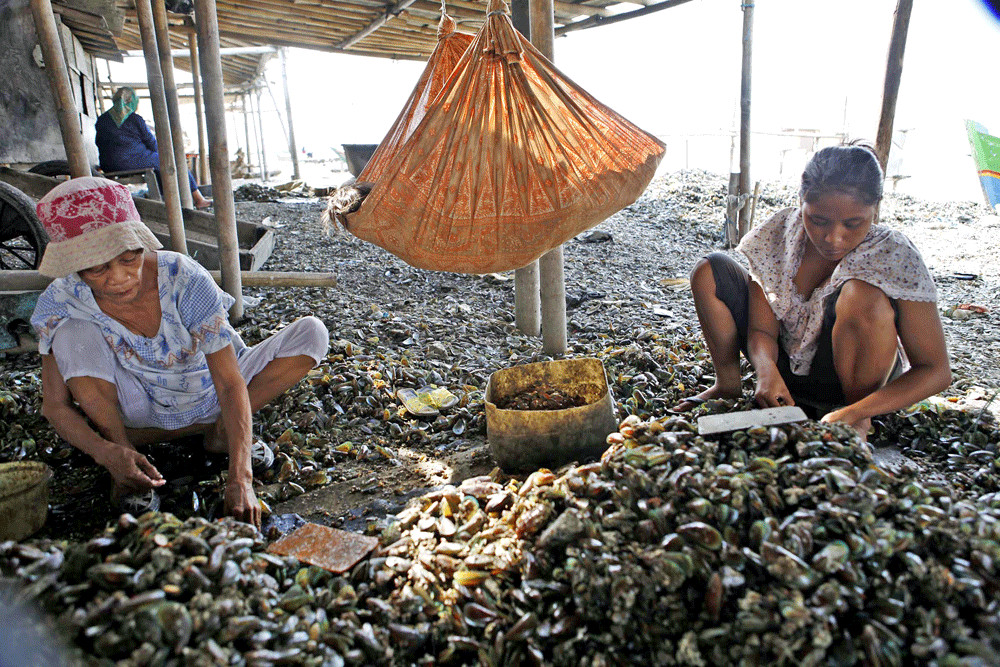Popular Reads
Top Results
Can't find what you're looking for?
View all search resultsPopular Reads
Top Results
Can't find what you're looking for?
View all search resultsThe plight of Jakarta Bay’s mussel men and women: ‘Death can happen anywhere’
A professor at Bogor Agricultural University's Faculty of Maritime Affairs and Fisheries, Etty Riani, said hazardous compounds from the Jakarta Bay could harm those who eat its seafood, which may lead to paralysis, physical disabilities and cancer, just like what happened in Minamata, Japan, in the 1950s.
Change text size
Gift Premium Articles
to Anyone
B
uckets of green mussels were unloaded from fishermen's boats on Monday and taken to dozens of young and middle-aged women in Muara Karang, North Jakarta.
Mussels from the Jakarta Bay, which is notorious for being heavily polluted by toxic and hazardous compounds, have to be thoroughly cleaned before they are sent out to markets in Greater Jakarta.
Doyok, 65, a fisherman in Muara Karang, said it was common for fisherfolk and mussel cleaners to get sick because of the hazardous compounds, with skin diseases and diarrhea among the bevy of illnesses that can fall upon them. Despite this, they still forage for mussels since they rely on it for their livelihoods.
"Yesterday, a mussel diver was hospitalized here, but he dived again as he recovered. Death can happen anywhere," Doyok told The Jakarta Post on Monday.
Etty Riani, a professor at Bogor Agricultural University's Faculty of Maritime Affairs and Fisheries, said the hazardous compounds from the bay could harm people who eat the contaminated seafood, which may lead to paralysis, physical disabilities and cancer, just like what happened in Minamata, Japan, in the 1950s.
“People who consume fish from the Jakarta Bay are susceptible to cancer and degenerative diseases like kidney failure,” Etty said.
Etty explained that metal compounds entered the body of a fish through its skin pores, gills or when it was eating, which then accumulate in the organs. She said hazardous compounds had been found in barracuda, pepetek (common ponyfish), sukang (leatherjacket fish), beloso (marble goby) and green mussels from the Jakarta Bay.
Doyok said it would be worse for fisherfolk in January and February, when rainfall is greater. The bay gets murkier, making it harder to dive and look for mussels.
"If the weather is good, we can have 80 to 100 more buckets [of mussels], and we could get Rp 4 million [US$286] a month. However, during these months [January and February], we can only get less than Rp 400,000 a month,” he said, saying the best season was from October to December.
Given these conditions, Doyok said he hoped the central government and the Jakarta administration would be firm on cracking down on factories that dispose of their waste into the sea.
North Jakarta Maritime, Fisheries and Food Security Agency head Rita Nirmala confirmed that eating fish and green mussels from the Jakarta Bay was dangerous, as they were contaminated with the metal compounds.
However, Rita said, the central and local administrations were still confused over how to take action against factories that polluted the bay since it was the estuary of all 13 rivers in the city, making it difficult to identify polluters.
"It demands strong political will for whoever leads Jakarta. This problem is very complex. We had the intention of relocating the fishermen who make a living in the polluted area to Jakarta's Thousand Islands waters in 2016 and to Panimbang, Banten, in 2010, but they refused,” Rita said.
She said fisherfolk were reluctant to look for mussels in waters near Thousand Islands and Panimbang because they were thinner as the water there was cleaner. The mussels in the bay, she said, were larger because of the pollutants. The heavier a mussel weighs, the more it is sold for at the market.
Rita said she could only appeal to residents to avoid seafood that came from the Jakarta Bay, especially green mussels. She warned of the dangers of consuming mussels contaminated by hazardous compounds. Such mussels usually appear bubbly instead of flat.
She advised those who insisted on consuming seafood from the bay to stick to fish, as they were less often exposed to pollutants because of their higher mobility.
Tarsoen Waryono, a professor at the University of Indonesia's Faculty of Geography, found in 2017 that metal compounds in the Jakarta Bay mainly came from rivers from the eastern side of the province, namely the Cilincing, the Cipinang and West Java’s Cibinong. Industrial areas specializing in chemicals or clothing are often a source of the pollutants in the rivers.
According to Tarsoen's study, the Mookervart River in Tangerang, Banten, and the Pulogadung industrial area in East Jakarta also carry metal compounds to the city's bay.
Many seafood lovers in Jakarta, however, are unaware of the risks of consuming seafood from the bay. Imam Santoso, 28, a resident of Cideng, West Jakarta, said he had no intention of giving up seafood even though he acknowledged that the Jakarta Bay might not be the cleanest body of water.
"I have consumed seafood, especially green mussels, since I was a kid, and I have been fine all this time," Imam said.
The Jakarta Maritime, Fisheries and Food Security Agency recorded that Jakarta residents consumed 39.6 kilograms of seafood per capita in 2018, lower than the national target of 47 kilograms. More than 90 percent of the seafood supply is delivered from other provinces. (ggq)










